How to Tackle Post Traumatic Brain Injury Syndrome
“Post-traumatic brain injury syndrome” refers to long-term repercussions from concussions and other head injuries. Someone using this term could be referring to one of three conditions:
Published peer-reviewed research shows that Cognitive FX treatment leads to meaningful symptom reduction in post-concussion symptoms for 77% of study participants. Cognitive FX is the only PCS clinic with third-party validated treatment outcomes.
READ FULL STUDY
If you’re experiencing memory issues after a head injury, you are not alone.
Some degree of memory loss after a head injury is common. For most, memory loss (and other symptoms) will resolve within a few days or weeks, but a few patients will continue to experience problems for months or even years after their injury. This ongoing condition is called post-concussion syndrome (PCS).
Many PCS patients end up frustrated because traditional treatment approaches do not address the underlying causes of their memory issues. Common medical advice is geared to help patients cope with their memory impairments rather than to recover brain function.
At Cognitive FX, we take a different approach. We target the underlying causes of symptoms that linger after a head injury. Our methods are based on cutting-edge diagnostics, recent scientific research, and an unprecedented, multidisciplinary collaboration that brings the best available therapies together under one roof.
This rigor is why Cognitive FX was the first treatment provider able to help Riley Horner, a young girl whose memory reset every few hours to June 11, 2019.
Key to our approach is treating the brain as an interconnected whole rather than trying to treat one symptom at a time. To “fix” your memory means all parts of the brain that contribute to memory formation and recall need to work well. Our patients often come in with deficits in memory, attention, and sensory processing that need to be rehabilitated simultaneously for them to see marked improvement.
Later in this post, we’ll detail this treatment approach and give examples of patients who recovered significantly from their memory loss symptoms. Throughout, we’ll cover needed information such as…
If you’re experiencing symptoms that won’t resolve after a mild traumatic brain injury, you’re not alone. And you’re not crazy. 90% of our patients show symptom improvement after just one week of treatment at our center specializing in post-concussion therapy. To see if you are eligible for treatment, sign up for a consultation.
.jpg?width=1000&height=445&name=memory-loss-after-head-injury%20(9).jpg)
Memory is not just one skill. There are several kinds of memory, including short-term memory, long-term memory, working memory, and episodic memory. Concussions (mild TBI, or mTBI) and other head injuries can affect different types of memory, potentially causing different types of amnesia.
Anterograde amnesia is the most common type of memory loss after a concussion. It’s often accompanied by other cognitive problems, such as difficulties with attention.
Patients with this type of memory loss struggle to remember new information but can remember events from before their injury. Anterograde amnesia leaves patients with difficulties at school or work and interferes with their ability to carry out their daily tasks. This type of short-term memory is frequently the last cognitive function to return as the patient recovers.
Patients with anterograde amnesia may experience:
Patients may remain confused and unable to store new memories for days, weeks, or even months after their injury. One extreme case of post-traumatic amnesia is that of teenager Riley Horner. In 2019, Riley was at a dance in Springfield, Illinois, when she was accidentally kicked in the head.
At the hospital, doctors ran a few tests and couldn’t find anything wrong, so Riley went home. However, the 16-year-old woke up the next day with no recollection of her injury and still thinking she was going to the dance that evening. In the days that followed, her memory started resetting every two hours. For six months, not only was she unable to make new memories, but she constantly woke up thinking it was the 11th of June, the day of her injury.
Medical professionals struggled for months to explain the extent of Riley’s condition. MRI and CT scans on Riley’s brain showed no abnormalities, and sadly, doctors were unable to suggest any potential treatment. This is not surprising given that structural CT and MRI scans cannot show the functional damage caused by concussion.
After Riley’s story went viral, her family found Cognitive FX. After just one week of treatment with us, Riley started making her first memories. By the end of week two, she was able to remember almost everything. “It’s truly a miracle, I don’t know what else to say! I have seen stuff here and there, but last night it was real to me that I have my daughter back! She will have a future,” said Sarah Horner, Riley’s mom.
While Riley did not regain 100% of her former cognitive ability, she was able to go back to school and pursue a college degree, a dream she had begun to worry wouldn’t happen.
Concussions may also affect prospective memory, in which patients can’t remember plans or other commitments long enough to attend them. Prospective memory is essential not just for daily living, but also for remembering activities important to recovery, such as taking necessary medications, completing rehabilitation exercises, and maintaining supportive social relationships.
Patients with loss of prospective memory may:
.jpg?width=1000&height=445&name=memory-loss-after-head-injury%20(7).jpg)
Retrograde amnesia is less common, but it can happen. Typically, patients lose the ability to recall events that have occurred during the period immediately preceding the brain injury. They may also be unable to remember events from days, weeks, or even years before the concussion. This is more common after a severe head injury.
Patients with retrograde amnesia may experience:
Sometimes patients struggle with both anterograde and retrograde amnesia. This is what happened to one of our patients, Ryan. His life was turned upside down after a car accident, causing a whole range of cognitive issues, including extensive problems with memory and focus.
When Ryan’s aunt told him about Cognitive FX, he decided to pursue treatment at the clinic. “Even after the first day, my energy level was already starting to go up. I was able to sleep better at night, and as the week went on, my energy — I have a ton of energy now. My focus is a lot better. I can multitask again, my long-term memory is pretty good now too, and short-term is not a problem. I can remember things people tell me, things I see.”
“The people you work with — they're so friendly,” he added. “It's the only place I've gone to where everyone really cares and asks you every day how you're doing. It's like a family environment, which helps you become more comfortable, which is important when you're trying to do therapy.”
Sometimes, patients with PCS don’t remember the injury itself. In simple terms, this means the brain has not stored the injury as a memory.
If you can’t remember the events that led to your concussion, you likely never will. Your brain didn’t store those memories. If that’s the case with you, the best way to learn about the injury is to ask family members, friends, or medical personnel who may have relevant information.
Though extremely rare, this type of memory loss can cause patients to forget not only their memories but also their identity. In extreme cases of this disorientation, they may not even recognize their own reflection in the mirror. This most often occurs after severe traumatic events, but in most cases, patients begin to remember themselves as they recover from the severe TBI.
Before we discuss how PCS patients can experience memory problems, it helps to understand how memory works. In very simple terms, there are three steps to learn and memorize new information: encoding, storage, and retrieval. Encoding is the initial learning of information; storage refers to maintaining information over time; and retrieval refers to the ability to access information at a later stage. If you want to find out more, we’ve written in more detail about how memory works in a healthy brain in our post about post-COVID memory loss.
.png?width=552&height=453&name=memory-loss-after-head-injury%20(1).png)
Forming and recalling a memory requires many parts of the brain to work in harmony. Concussions disrupt this process, but it’s impossible to determine exactly which step is affected. One reason for this is that these three steps are not as separate as this description implies. Rather, all three steps are interconnected. For example, how we encode a new memory will determine how it’s stored and how it can be recalled later. Patients also need to pay enough attention to form a new memory in the first place, and all the parts of the brain that encode, store, and retrieve memories need to be in full working order.
Post-traumatic memory loss is likely due to some combination of the following causes:
Several areas in the brain are involved in encoding and storing memories, and damage to any of these areas can cause memory loss. Some of the main areas of the brain involved in memory include the:
As different types of memories use different areas and different systems in the brain, concussions can cause memory loss in one type of memory but leave other types intact. For example, damage to the frontal cortex is more likely to cause short-term memory loss, whereas damage to the hippocampus disrupts the memory consolidation process used to store long-term memories.
The autonomic nervous system (ANS) controls a variety of bodily functions, including blood pressure, heart rate, and breathing patterns.
Most of this control is achieved via the sympathetic (SNS) and the parasympathetic (PNS) nervous system. The SNS prepares your body to react to a threat (known as the “fight or flight” reaction), and the PNS helps to calm the body (known as the “rest and digest” part of the nervous system). Under normal circumstances, the PNS and SNS work together in harmony and change dominance when needed.
Concussions, however, can disrupt this balance, and the SNS tends to stay activated even when it’s not needed. This causes a variety of physical symptoms, such as headaches, blood pressure changes, heart palpitations, and problems breathing, to name just a few.
In addition to regulating physical body functions, recent studies have identified that the PNS also enhances memory skills when it’s active. Researchers don’t fully understand this mechanism, but there’s some speculation that an active PNS improves how new information is processed by regulating dopamine production in the brain. Patients with an underactive PNS may see memory improvement as their autonomic nervous system responds to therapy.
Further reading: Autonomic nervous system dysfunction after a concussion
Problems with memory can also develop due to changes in neurovascular coupling. When brain cells need energy and oxygen to perform a particular task, they request these resources from surrounding blood vessels. These vessels then deliver the right resources to the right place at the right time in the right amount. This complex, dynamically regulated connection between the vascular system and the brain is called neurovascular coupling (NVC).
However, concussions disrupt this communication between brain cells and blood vessels. As a result, resources may be delivered to the wrong place, at the wrong time, or in the wrong amounts (too much or too little), which means the brain can’t continue to operate normally. Depending on which areas are affected, this disruption may cause different symptoms. For example, if it affects areas involved in creating new memories, patients may experience difficulties in processing and retrieving different types of memories.
Concussions also trigger localized inflammation near the site of injury, affecting how these areas receive the resources to maintain normal operations. This can persist for months and cause symptoms such as headaches, dizziness, cognitive impairment, irritability, anxiety, and insomnia. High inflammation levels are also associated with poorer cognitive skills, including problems with short-term memory and learning new information.
Sleep is vital for the formation and consolidation of memories. Getting enough high-quality sleep helps with multiple cognitive skills, including attention, concentration, memory, problem-solving, creativity, emotional processing, and judgment.
Many PCS patients experience sleep disturbances, which in turn can cause memory issues. For example, broken sleep cycles impair memory consolidation. In addition, patients who are sleep-deprived can form false memories and have poorer working and visual-spatial memory.
Concussions can cause breathing irregularities, which in turn can affect memory-forming skills. For example, studies show that alterations in breathing patterns affect the hippocampus, which disrupts memory recall.
The ANS is also involved in this process. When you focus your attention on something with the intention to form a new memory, your brain activates the sympathetic nervous system and increases breathing rates to promote blood flow to the brain. Under normal circumstances, this is a short-term change; the parasympathetic nervous system reduces breathing rates back to normal soon after. However, as described earlier, in PCS patients, the sympathetic branch is dominant most of the time. As a result, both increased sympathetic activity and decreased parasympathetic activity lead to poorer cognitive function, including memory and attention.
.jpg?width=1000&height=445&name=memory-loss-after-head-injury%20(8).jpg)
Most treatment providers are unable to address the underlying cause of memory loss in mild head injury patients. There are some commonly offered, helpful therapies and options that we’ll discuss below. Then, we’ll explain how treatment at Cognitive FX takes the best of these treatments and improves upon them to get better results for PCS patients.
Cognitive therapy is designed to help patients who are experiencing cognitive issues after a concussion, such as poor memory, difficulties with attention, and problem-solving. A cognitive therapist will guide patients through exercises designed to improve those cognitive abilities.
Common exercises to help with memory may include:
Occupational therapy can be very beneficial for patients with memory loss. For example, therapists may ask patients to engage in concentration and memory games, such as word searches, card games, and puzzles.
Occupational therapists also work with patients to develop routines that minimize the impact of memory loss, creating compensatory strategies that allow patients to participate in many daily activities. For example, patients might write reminders and store important items, such as their car keys and phone, in the same place every day. Studies confirm these therapeutic interventions have a significant impact on memory, as well as mental health and overall wellness.
Memory problems may also stem from other conditions, such as depression and anxiety. The current theory is that anxiety and stress hinder memory skills because the brain diverts its attention and energy to identify the perceived threat instead of engaging in whatever cognitive task the patient is trying to complete.
Treating those conditions may help improve memory. In this case, talk therapies, such as cognitive behavioral therapy or counseling, are effective options. CBT encourages the patient to take an active role in managing their thoughts, feelings, and behaviors. It helps patients change how they think, feel, or act to improve their mood and reduce stress.
Further reading: CBT for post-concussion syndrome
There is mounting evidence that mind-body therapies, such as meditation, mindfulness, and breathing exercises (which we teach our patients at Cognitive FX), are promising treatment options for memory problems.
For example, multiple studies show that engaging in regular meditation promotes beneficial changes in the brain, supports communication between different areas, and enhances nutrient utilization in regions involved in cognitive processing, memory consolidation, and attention. Ultimately, patients experience improved memory, attention, executive function, and processing speed to help combat the long-term effects of brain injury.
Music exposure also positively affects the brain, helping combat loss of memory. Studies show that listening to familiar music improves cognitive processing, enhances communication between different areas of the brain, and stimulates activity in areas involved in emotion, working memory, and attention.
What’s more, music doesn't just help patients retrieve stored memories, it also helps them create new ones. Healthy people scored better on tests of memory and reasoning after completing a course of moderate physical exercise to musical accompaniment (as contrasted to those who did not have music).
There are no medications specifically for the treatment of memory loss, but there are some prescription drugs, such as methylphenidate (Ritalin) and lisdexamfetamine dimesylate (Vyvanse), to assist with attention problems. This can sometimes help with memory. These medications often have side effects, and we advise that you discuss the pros and cons with your health care provider before starting any new medications.
Further reading: Medications for common symptoms of concussion
You may come across many different dietary supplements that claim to help with memory problems. However, most of these, including apoaequorin, coenzyme Q10, omega-3 fatty acids, and various vitamins, lack compelling evidence to support their use. In addition, the U.S. Food and Drug Administration (FDA) does not test dietary supplements' safety, effectiveness, or labeling before products go on the market. Our advice is to avoid using these products as memory enhancers, or at least, ask your doctor before you start taking anything.
Further reading: Natural remedies for concussion symptoms
Memory problems after a concussion or other head injury are rarely the only symptom a patient experiences. If you are experiencing memory loss or other ongoing memory symptoms, you’re likely also suffering from an assortment of other common concussion symptoms, such as emotional changes (sometimes mistaken for personality changes), headaches, dizziness, blurry vision, brain fog, and sleep problems.
These symptoms are best treated in combination instead of one by one. At Cognitive FX, we deploy multidisciplinary therapy and guided exercise to help your brain heal. This treatment process begins with an in-depth assessment to guide your therapy.
Key to our examination is a state-of-the-art brain imaging scan called functional Neurocognitive Imagining (fNCI). With this scan, our team can identify which areas of your brain were affected by the brain injury. In practical terms, the scan looks at 100 different areas in the brain while patients perform a series of cognitive tasks. It also looks at how these brain regions communicate with each other.
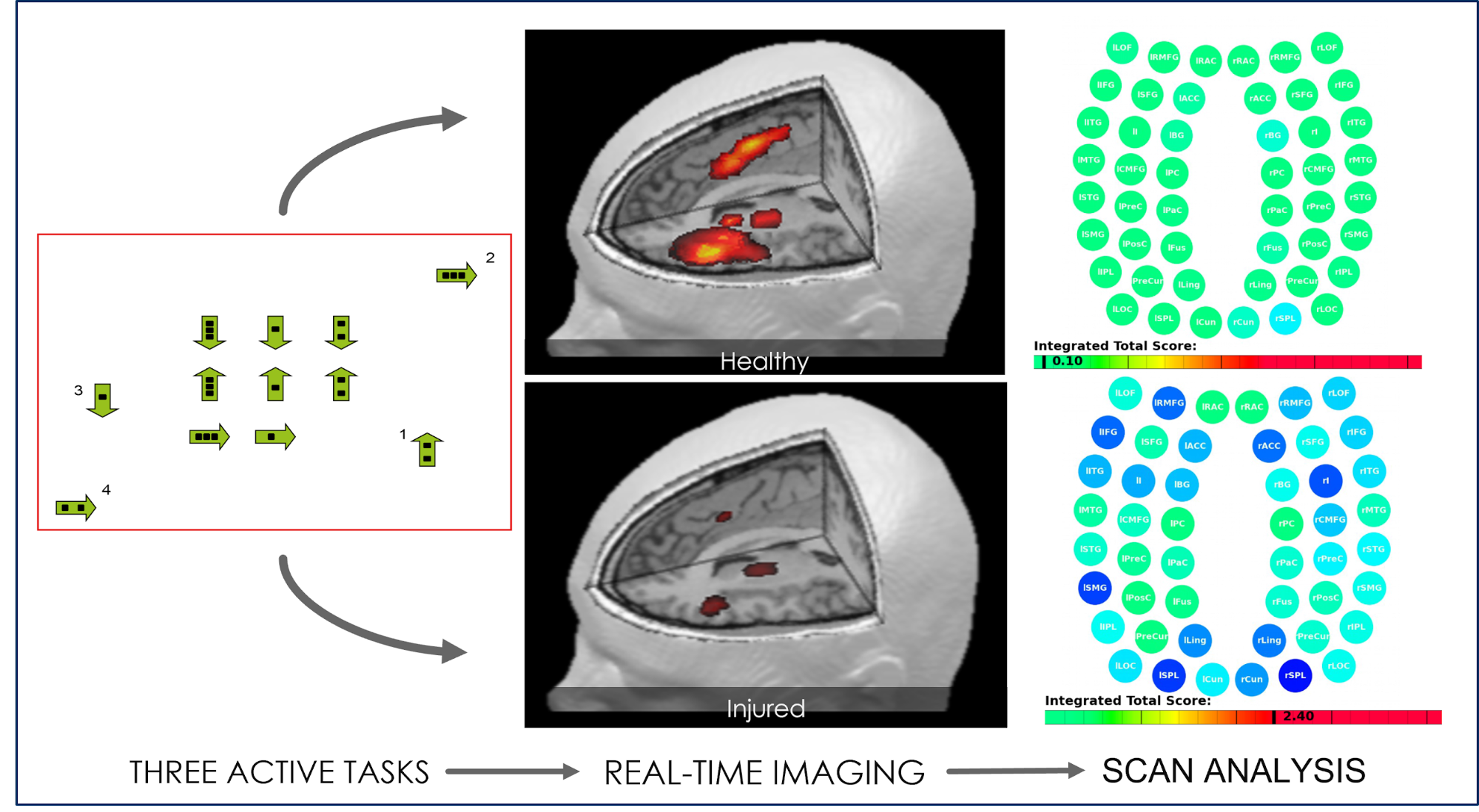
The results from the scan are then used to design a personalized treatment plan — called Enhanced Performance In Cognition, or EPIC. Here’s a snippet of a post-scan analysis of Dr. Alina Fong and Lauren Taylor Brem discussing how Lauren struggles to find words in moments of tension:
After you’ve discussed your results and treatment approach with our team, we begin a three-step process:
In the first step — prepare — patients complete short sessions of aerobic exercise intervals, typically on a stationary bike or treadmill. This triggers the release of a series of neurochemicals, including one called brain-derived neurotrophic factor (BDNF), which boosts the effect of subsequent therapy. Crucially, BDNF is a key component in healthy memory function.
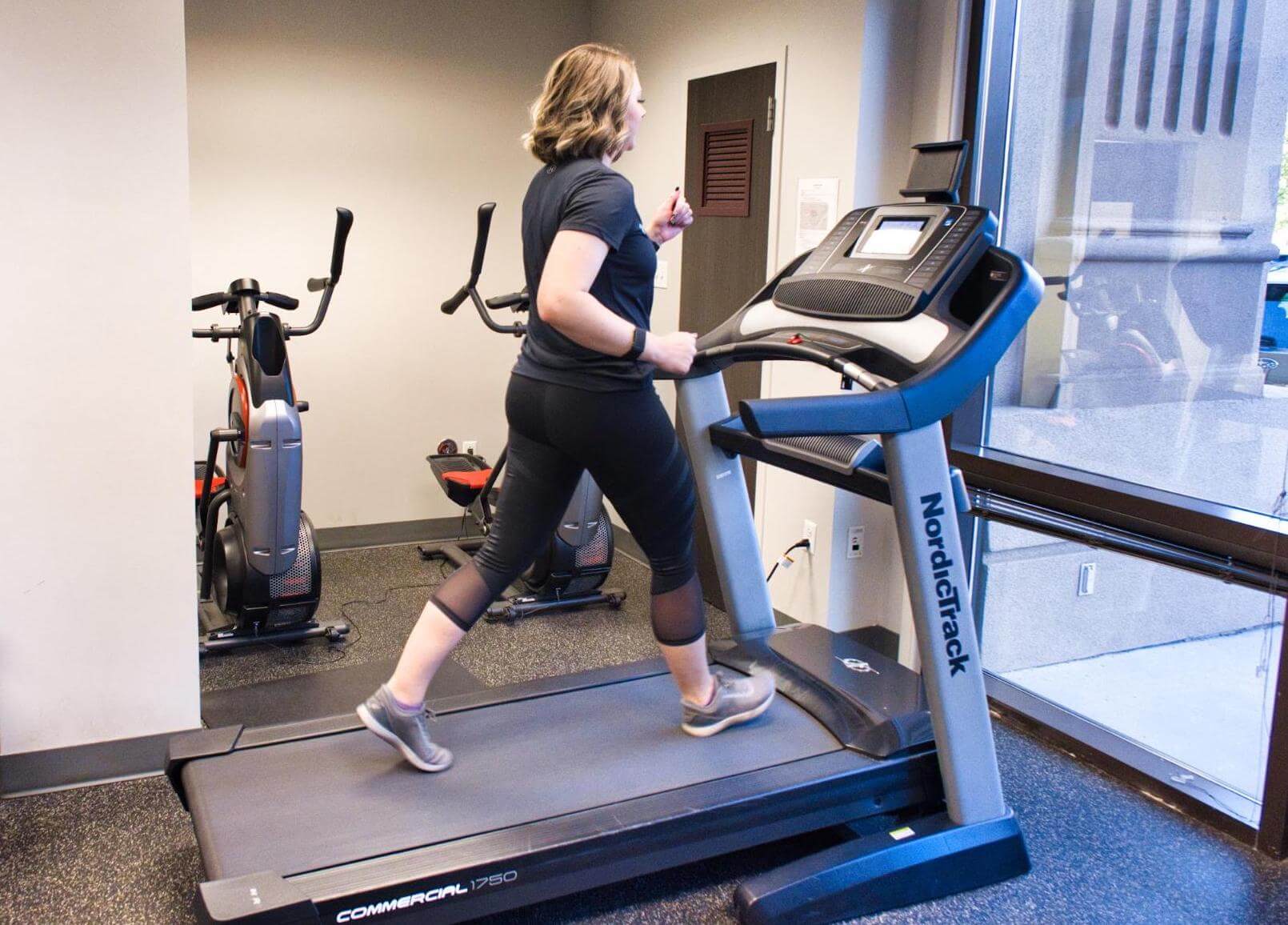
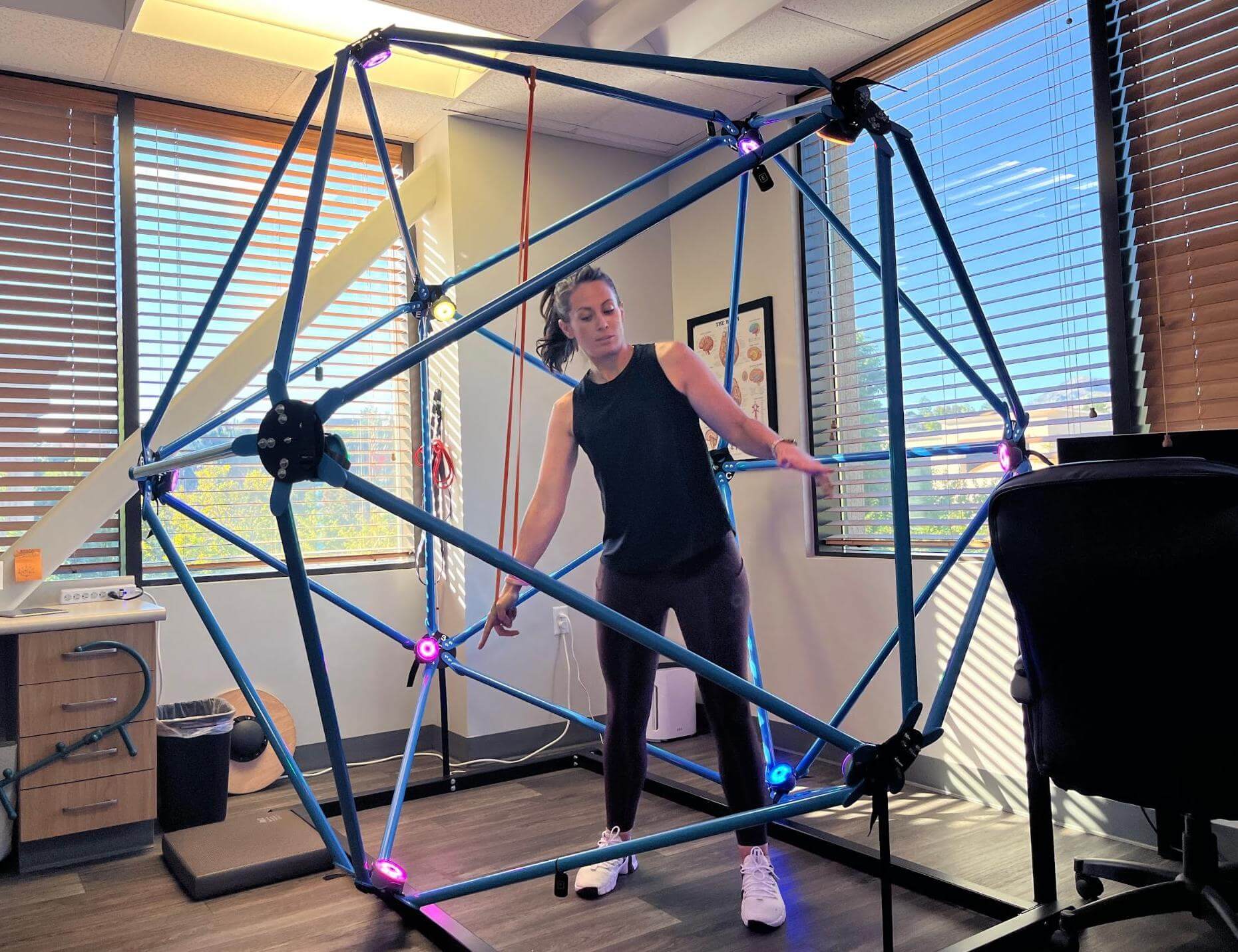
The final step — recover — involves periods of rest and relaxation in between therapy sessions. This may include breathing exercises to promote relaxation, neuromuscular massage of the neck and shoulders, and mindfulness exercises.
This treatment cycle aims to restore healthier neurovascular coupling, improve ANS function, and reduce the incidence and severity of PCS symptoms, including memory problems.
One of the main therapies for patients struggling with memory is cognitive therapy. Therapists will ask patients to complete a series of exercises that promote thinking, concentration, and memory. For example, working on short-term memory may involve reading a short text and then answering a few simple questions to see how much information you can retain. Or, you might be asked to memorize a series of photographs and recall details at your appointment the following day.
Given its connection with memory, therapy also involves exercises to improve your attention. For example, a game for selective attention (the ability to focus on only one thing) involves tapping whenever you hear a pair of opposite words in a list (such as ‘room’ ‘hot’ ‘cold’ ‘bear’ ‘door’), while ignoring the news radio playing in the background.
Our therapists can also improve your divided attention (the ability to switch between tasks) by asking you to sort cards by suit with the cards facing down at the same time as doing simple math calculations.
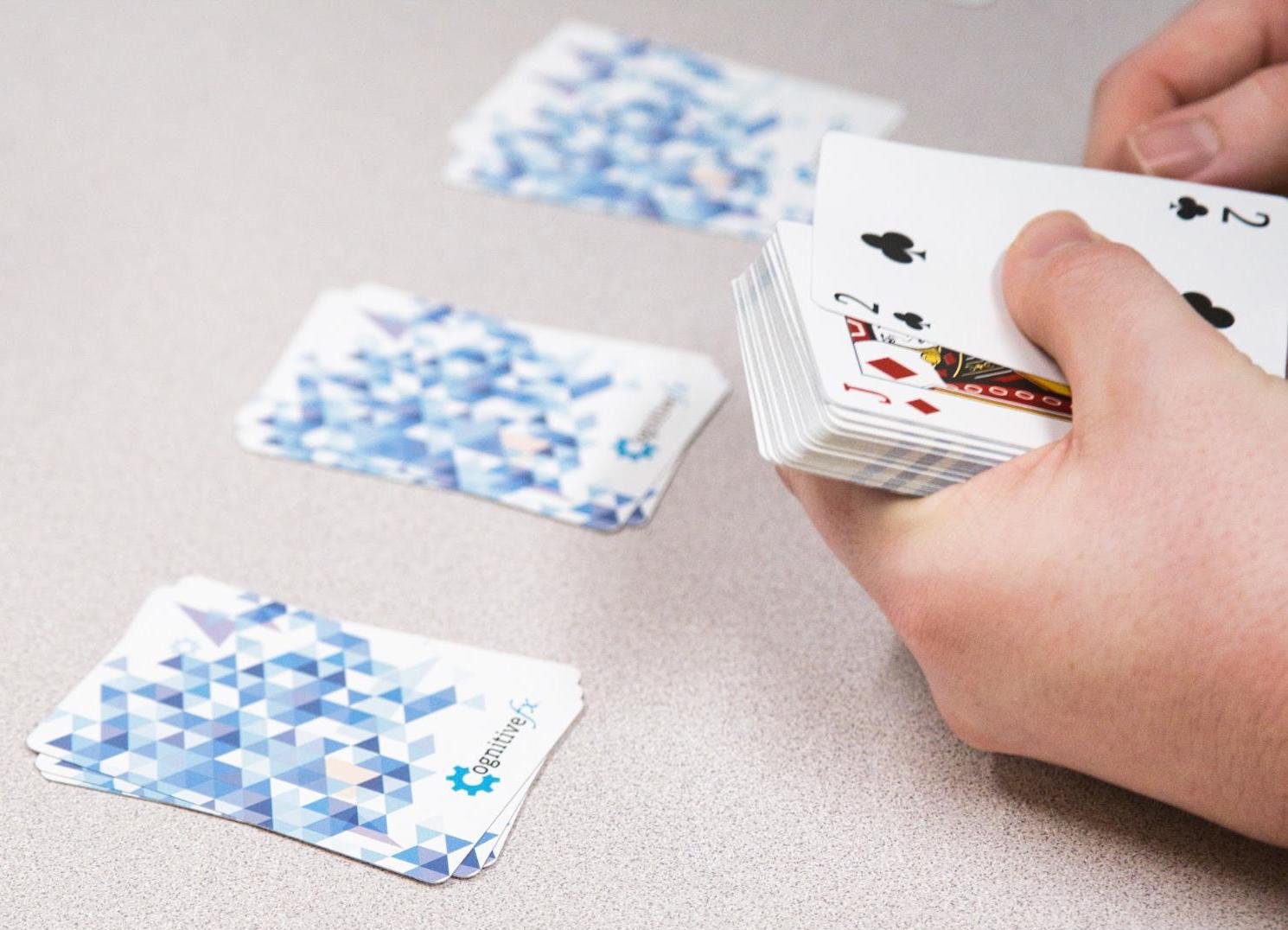
Once treatment is completed, patients meet with a member of our team to assess progress and to assign an at-home routine. The list typically includes a few aerobic exercises, cognitive activities, and ways to rest. Doing these exercises at home is a good way to ensure long-term recovery after treatment.
.jpg?width=1000&height=445&name=memory-loss-after-head-injury%20(6).jpg)
PCS patients often struggle to remember things from day to day. Here we describe a few different strategies to use at home to help patients cope with memory impairments during their recovery.
Further reading: At-home solutions for memory loss
Enhancing memory and attention with targeted exercises can significantly improve memory function in PCS patients. These exercises are only effective if you do them consistently. Gradually increase the duration and complexity of these exercises to improve your cognitive skills.
A few examples include:
Patients can improve memory recall by using a variety of memory encoding strategies. Using these methods on a regular basis can enhance the way your brain encodes and stores memories, making them easier to retrieve later on.
A few examples include:
In addition to attention and memory exercises and encoding strategies, PCS patients may also benefit from using multiple compensatory strategies to provide additional support for memory retention.
A few examples include:
Combined with therapy and compensatory strategies, these lifestyle changes can help PCS patients recover faster and overcome their memory issues. A few examples include:
.jpg?width=1999&height=1500&name=memory-loss-after-head-injury%20(3).jpg) Patient Scotty Allen, a popular YouTuber who shared his concussion story, discusses his story with the Cognitive FX team.
Patient Scotty Allen, a popular YouTuber who shared his concussion story, discusses his story with the Cognitive FX team.
Memory problems after a head injury are more common than most people realize. They can happen after even a mild brain injury with no loss of consciousness. Fortunately, there are treatment options for this long-term symptom of head injury. If you want to learn even more about memory problems after head trauma, see our post on memory loss recovery stories & FAQs.
If you’re experiencing symptoms that won’t resolve after a mild traumatic brain injury, you’re not alone. And you’re not crazy. 90% of our patients show symptom improvement after just one week of treatment at our center specializing in post-concussion therapy. To see if you are eligible for treatment, sign up for a consultation.

Dr. Mark D. Allen holds a Ph.D. in Cognitive Science from Johns Hopkins University and received post-doctoral training in Cognitive Neuroscience and Functional Neuroimaging at the University of Washington. As a co-founder of Cognitive Fx, he played a pivotal role in establishing the unique and exceptional treatment approach. Dr. Allen is renowned for his pioneering work in adapting fMRI for clinical use. His contributions encompass neuroimaging biomarkers development for post-concussion diagnosis and innovative research into the pathophysiology of chronic post-concussion symptoms. He's conducted over 10,000 individualized fMRI patient assessments and crafted a high-intensity interval training program for neuronal and cerebrovascular recovery. Dr. Allen has also co-engineered a machine learning-based neuroanatomical discovery tool and advanced fMRI analysis techniques, ensuring more reliable analysis for concussion patients.
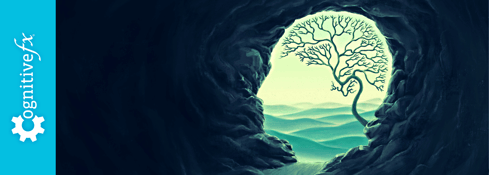
“Post-traumatic brain injury syndrome” refers to long-term repercussions from concussions and other head injuries. Someone using this term could be referring to one of three conditions:

Many people associate stuttering with childhood, but a sudden onset of stuttering can also occur after a head injury. This phenomenon, known as acquired stuttering, is one of many symptoms that can...
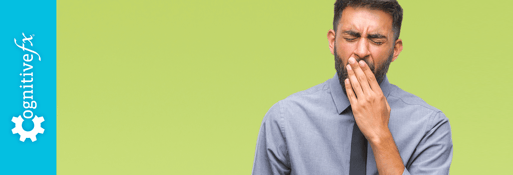
It’s not uncommon for people in today’s society to be tired. The demands on our time seem to be never ending. However, there’s a difference between being tired from being on the go all of the time...
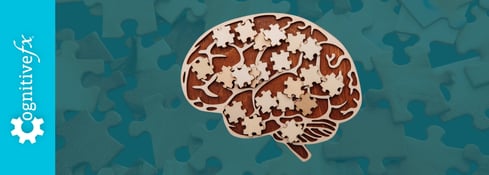
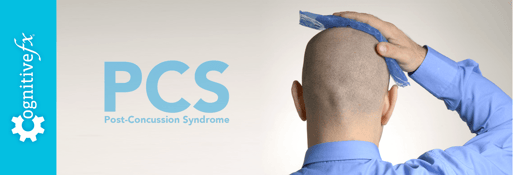
In post-concussion syndrome (PCS), a patient with a mild traumatic brain injury (mTBI) experiences persistent symptoms from the injury. If left untreated, the symptoms might last months, years, or...
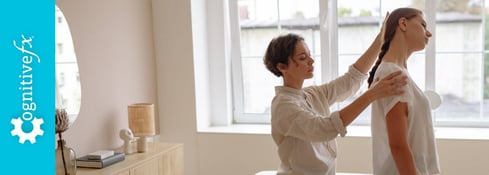
Recovering from a traumatic brain injury (TBI) often means dealing with physical symptoms, such as headaches, balance issues, weak muscles, and vision problems. These symptoms can affect every aspect...
Published peer-reviewed research shows that Cognitive FX treatment leads to meaningful symptom reduction in post-concussion symptoms for 77% of study participants. Cognitive FX is the only PCS clinic with third-party validated treatment outcomes.
READ FULL STUDY